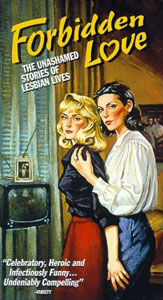Forbidden Love: The Unashamed Stories of Lesbian Lives
| Forbidden Love: The Unashamed Stories of Lesbian Lives | |
|---|---|

VHS cover
|
|
| Directed by |
Lynne Fernie Aerlyn Weissman |
| Produced by |
Margaret Pettigrew Ginny Stikeman |
| Written by | Lynne Fernie Aerlyn Weissman |
| Music by | Kathryn Moses |
| Cinematography | Zoe Dirse |
| Edited by |
Denise Beaudoin Cathy Gulkin |
| Distributed by |
National Film Board of Canada Women Make Movies |
|
Release date
|
4 August 1993 (USA) |
|
Running time
|
85 mins. |
| Country | Canada |
| Language | English |
Forbidden Love: The Unashamed Stories of Lesbian Lives is a 1992 Canadian documentary film about the lives of lesbian women and their experiences of lesbian pulp fiction. It was written and directed by Lynne Fernie and Aerlyn Weissman and featured author Ann Bannon. It premiered at the 1992 Toronto Festival of Festivals and was released in the United States on 4 August 1993. It was produced by Studio D, the women's studio of the National Film Board of Canada.
In May 2014, the NFB re-released the film in a digitally remastered version.
The movie opens with a dramatized scene of two women saying goodbye at a train station, alluding that they were to run away together. One of the women, named "Beth" declines to go with "Laura" and leaves her at the station.
A discussion of the impact of lesbian pulp fiction for women in the 1940s and 1950s begins, featuring Ann Bannon, discussing her experiences as a writer in the 1950s. Nine Canadian women are interviewed throughout the documentary: Keely, a butch woman living near Vancouver, Stephanie, also in Vancouver, Reva, in Victoria, B.C., Lois, also in Toronto, Nairobi, a black woman living in Montreal, Jeanne, also in Toronto, Amanda, a Haida woman who lived in several Canadian cities, Carol, a butch woman living in Ontario, and Ruth, also living in Vancouver.
Each woman discussed her experience in realizing her attraction to women, and how they pursued relationships in the repressive society. Some women felt they had to choose to be butch or femme as all women who went to bars during that time had to choose one or the other. The women who frequented the bars discussed the kinds of establishments they were, secretive and usually dingy. Ruth described the only bar where women were allowed to dance with each other in Vancouver as a "dive". Bars sometimes were open for a year before they were shut down or changed management. Some higher class establishments would only allow women with male escorts, so the women took gay men along. Stephanie, Lois, and Carol discussed the fights that took place between butch women over femmes since the ratio was about ten to one. Amanda discussed her experiences living in a white society. She found gay bars depressing since most of the people were usually very drunk, so she often went to bars where black people went since she was bothered less there. Nairobi described in detail what it was like to be in a police raid, and Stephanie described how the women met with police harassment. Each woman also described the relationships they had. Reva and Jeanne both discussed how they began relationships with ex-girlfriends of ex-girlfriends, who in turn lived with each other and Stephanie discussed being in an abusive relationship. Each woman talks about her life with frankness and humor. The interviews conclude with summaries of the past 20 years of each woman's life.
...
Wikipedia
